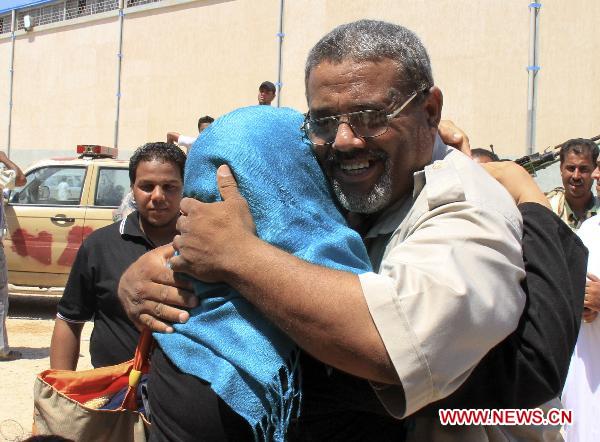Red Cross reunites divided Libyan families
 0 Comment(s)
0 Comment(s) Print
Print E-mail
Xinhua, June 25, 2011
E-mail
Xinhua, June 25, 2011
|
Reunited brother and sister embrace each other after International Red Cross ship the Ionis arrives to the rebel port of Benghazi, Libya, June 24, 2011. Over 300 people arrived Friday in Benghazi by the boat from Tripoli. [Xinhua/Li Zhen] |
A humanitarian vessel carrying about 300 people arrived in Libya's eastern city of Benghazi on Friday, in a move that may start contacts between the Libyan government and the rebels after four months of fighting.
After a 24-hour trip, the first group of 300 people who were separated from their families due to the ongoing conflicts between Libyan leader Muammar Gaddafi and the rebels finally arrived on Friday in Benghazi, and hundreds of others are expected to return home in the rebel stronghold in the coming days.
"The International Committee of the Red Cross (ICRC) is organizing this event on purely humanitarian bases to reunite families who are separated by the recent conflicts," ICRC spokesperson Dibeh Fakhr said.
During the past two months, the ICRC worked with authorities of the two sides through transparent dialogue to explain the humanitarian reason behind the work, Fakhr said.
"We submit the names of the people after receiving their applications in our offices in Tripoli and Benghazi to get approval from both sides," she added.
The Red Cross ship also brought dozens of detained rebels back to their base, but the spokesperson denied that there are any prisoners from Benghazi being swapped on board.
Khalid Abdul al-Rahman, a 42-year-old businessman, returned to Benghazi with his wife and two daughters after he lost his company in Tripoli due to the ongoing conflicts.
"I went to Tripoli six months ago, and I am very happy to return home although it took me three months to wait for the approval," he said.
Meanwhile, more than 100 Tripoli residents stranded in the east will be transferred to the west, Fakhr said.
Libyan rebels said Friday that they were having indirect contacts with the Gaddafi government to find a solution to the deadlock, but insisted that Gaddafi should step down.
A coalition including France, Britain, the United States and some Arab countries have been carrying out air strikes against Gaddafi's troops under a United Nations resolution since March 19.
With more and more countries recognizing the rebel National Transitional Council as the legitimate representative of the Libyan people, the Gaddafi government started to boost its diplomatic campaign to call for elections, which was rejected by the rebels who set Gaddafi's departure as the precondition of a ceasefire.






